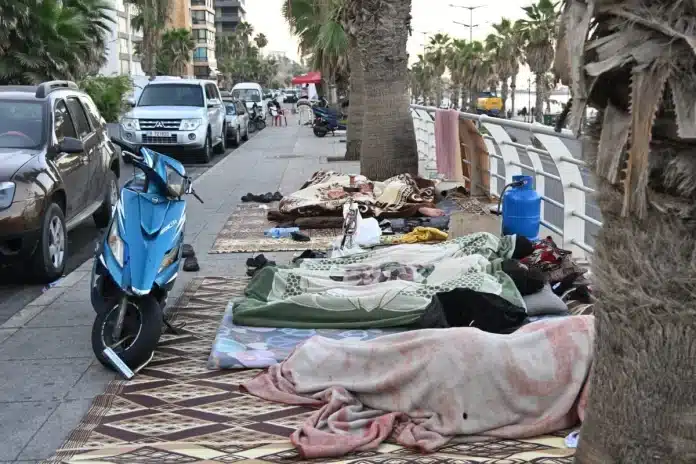As bombs rained down on Beirut, thousands left the city. This is what life is like for those that are still there.
“Nobody sleeps anymore,” says Jennifer Moorehead. “There was a massive strike just north of Beirut just now. And there’s an Israeli drone going overhead 24/7.”
The aid worker, who leads Save the Children’s team in Lebanon, looks out from her apartment on to the streets of Beirut.
“Beirut looks like a refugee camp,” she tells i via video call. “It’s full of people sleeping rough, families sleeping on the ground with their belongings piled around them. People don’t know where to go. There’s not enough shelters there yet. Shops are shuttered, everything is closed. It’s a shocking scene.
“The atmosphere is tense, stressed, fearful. People fear Lebanon is going to become like Gaza.”
After almost a year of border skirmishes between the Israel Defence Forces (IDF) and Lebanese militant group, Hezbollah, the conflict took a dramatic new turn at the end of September.
After killing Hezbollah leader Hassan Nasrallah in an air strike and orchestrating the explosion of thousands of pagers belonging to members of the group, Israel launched a series of ground operations inside Lebanese territory coupled with a wave of bombardments from the air – including on the capital of Beirut.
In response, Hezbollah has scaled up its missile attacks on northern Israel, sending 222 projectiles on Friday alone and forcing thousands to flee.
More than 175,000 people have fled from Lebanon into neighbouring Syria, though this crossing has also been bombed.
“That does take a psychological toll. This war is very intimate – the shelling is in densely populated residential areas (targetting mostly civilians). There’s nowhere safe to go, and there’s always a new area being bombed.”
The streets of Beirut are lined with cars where people are sheltering after being forced to leave their homes.
Others are sleeping “on the roads or by the sea”, according to Maya Andari, a fellow humanitarian with CARE Lebanon.
Mattresses, blankets and pillows are in short supply as people flee their homes, and those remaining have shot up in price.
Nearly 350,000 people – including 31,000 families – were living across 820 makeshift shelters within Lebanon at the end of September.
Not all shelters are equipped with proper showers, sanitation facilities, hot water and heating, according to humanitarians on the ground.
The UK has already evacuated more than 250 British nationals and their immediate relatives, with a fourth – and currently final – flight due to leave Beirut on Sunday. It has also deployed 700 British troops and civil servants to Cyprus for contingency planning.
One of those forced to flee his home is 35-year-old Rakan Ashkar, who lived in a village in the south of Lebanon with his wife and three children under the age of six, before being evacuated in just 45 minutes on Israeli orders this week.
He is now staying with relatives in Beirut and doesn’t know when – if ever – he will be able to return home.
“We don’t know when the light at the end of the tunnel will show. We don’t know if we will be back in a few days, a year, or a decade maybe. Or whether we’ll have homes to return to at all,” he says.
“I’m 35 years old. I should be at the age where I’m full of hope for the future of my country. I’m hopeless, honestly. I have a ten month old born during the war, in December 2023. She has already experienced war and she’s not even a year old. This is the type of country we live in. Every generation has experienced war, from the one year old to the 60-year-old. This is probably the fourth or fifth war I’ve been through.
READ ALSO:
Palestine: Israeli bombardment kills 29 in Gaza
“It begs the question… why do we stay? My children could realise their dreams if I left. But also, we have an absolute love and passion for our village and we want to stay there. We want to see our children grow there in a community that loves eachother. We want to retain the heritage of our fathers and grandfathers… but we also want a future for our children. Is it that hard to achieve?”
The Lebanese healthcare system is creaking under the weight of the conflict.
There have been more than 1,000 deaths and 6,352 injuries in Lebanon in less than two weeks since the escalation at the end of September, according to the International Migration Organisation.
This brings the total to more than 1,800 killed and 9,100 since the Hamas attacks of 7 October 2023.
More than 37 Primary Health Care Centres have been forced to close due to safety concerns, Save the Children said, while airstrikes have severely damaged 25 water facilities, leaving 300,000 people without access to clean water.
“After the pager event, around 8,000 presented at hospitals in 15 minutes,” says Ms Moorehead.
“A tsunami hit hospitals and they were overwhelmed. So they were already overstretched and supplies were depleted, and then this escalation began.
“Since then, we’ve seen mass casualty events, with entire families killed. There’s extreme insecurity. The World Health Organisation has done a lot of work to bring in medical supplies, but they’re extremely stretched.”
Schools have also been closed, with around 700 transformed into shelters.
“This is the sixth year of significant disruption to education, where the school year has not reached the threshold of actually delivering the curriculum. That is going to take decades to recover from,” says Ms Moorehead.
As well as the risk of death by bombing, Save the Children warn that children are also at risk of hunger, neglect and exploitation as families are forced to flee.
“School is the most important way to offer stability, give life-saving messages about things like mine awareness, and keep students safe. There’s an attempt to launch hybrid learning, but as we saw during Covid, that’s hard enough at the best of times, let alone in war.”














